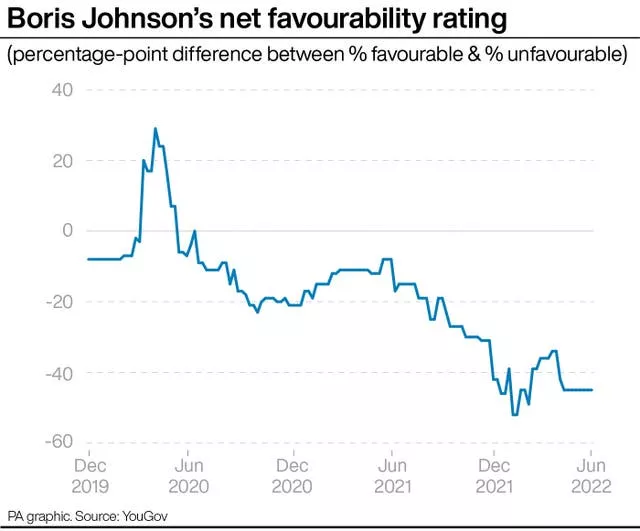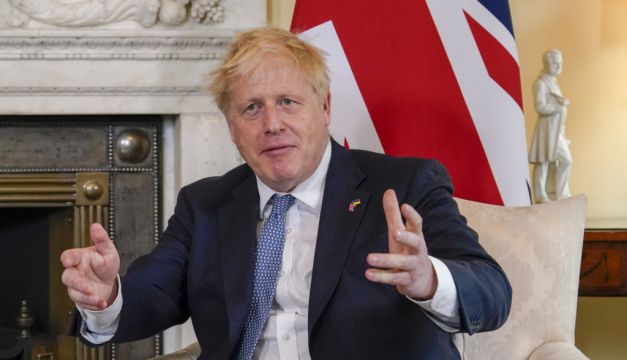British prime minister Boris Johnson has survived a confidence vote in his leadership of the Conservative party but his authority has been dealt a significant blow.
Conservative MPs voted by 211 to 148 in support of Mr Johnson but the scale of the revolt against his leadership leaves him wounded.
When former British prime minister Theresa May faced a confidence vote in 2018 she secured the support of 63 per cent of her MPs – but was still forced out within six months.
Mr Johnson saw 41 per cent of his MPs vote against him, a worse result than Mrs May.
He told reporters in Downing Street: “I think it’s an extremely good, positive, conclusive, decisive result which enables us to move on, to unite and to focus on delivery and that is exactly what we are going to do.”
He rejected the assertion that he was now a lame duck prime minister who needed to call a snap election to secure a new mandate from the public, insisting he was focused on the public’s priorities.
The scale of the revolt against Mr Johnson’s leadership has left him vulnerable, and he could suffer further blows in two key by-elections on June 23rd.
But he was bullish as he told reporters that he had secured a “very good result for politics and for the country”.
Earlier on Monday he had promised future tax cuts and highlighted his own record of electoral success as he sought to win over wavering MPs.
But with concern over the partygate scandal, economic policy, drifting opinion polls and Mr Johnson’s style of leadership, he faced a difficult task to persuade his doubters.

The ballot was triggered after at least 54 MPs – 15 per cent of the party’s representatives in the Commons – said they had no confidence in the British prime minister.
Mr Johnson wrote to Conservative MPs and addressed them at a private meeting in Westminster in the hours before voting began.
He told the meeting that “under my leadership” the party had won its biggest electoral victory in 40 years, and pledged future tax cuts, with British finance minister Rishi Sunak expected to say more in the coming weeks.
He warned them that party splits risked the “utter disaster” of Keir Starmer’s Labour entering Downing Street, propped up by the Scottish National Party.
“The only way we will let that happen is if we were so foolish as to descend into some pointless fratricidal debate about the future of our party,” he said.

He told Conservative MPs: “I understand the anxieties of people who have triggered this vote” but “I humbly submit to you that this is not the moment for a leisurely and entirely unforced domestic political drama and months and months of vacillation from the UK”.
In an attempt to win round low-tax Tories, Mr Johnson said: “The way out now is to drive supply side reform on Conservative principles and to cut taxes.”
Mr Johnson took five questions during the meeting, two of which were “hostile”, a senior party source said.
Tory former chief whip Mark Harper said that if Mr Johnson stayed in post he would be asking MPs to “defend the indefensible”.
Mr Johnson was informed on Sunday that he would face the vote.
Graham Brady, the chairman of the backbench 1922 Committee, confirmed he had received the letters from Conservative MPs needed to trigger the ballot on Sunday, with a “clear indication” that there would be more to come following the conclusion of the Platinum Jubilee festivities.
A steady stream of Conservative MPs called publicly for Mr Johnson to stand down in the wake of Sue Gray’s report into breaches of the Covid regulations in government offices.
And because we are no longer trusted by the electorate, who know this too, we are set to lose the next general election.
— Jeremy Hunt (@Jeremy_Hunt) June 6, 2022
But Tory concerns go far wider, covering Mr Johnson’s policies, which have seen the tax burden in the UK reach the highest in 70 years, and concerns about his style of politics.
Supporters of Mr Johnson mounted a determined effort to bolster his position, with a string of ministers appearing on the airwaves and social media posts from loyal MPs.

Brexit opportunities minister Jacob Rees-Mogg said victory by a single vote would secure Mr Johnson’s job.
“One is enough, it’s no good saying that the rules of the party say something and then behind it unofficially there is some other rule that nobody knows and is invented for the purpose,” he told Sky News.
“I obviously want the prime minister to get as big a majority as possible, I think that would be helpful and it would close this matter down between now and the next general election, which would be good for the country, good for the Conservative Party, but one is enough.”
Northern Ireland Secretary Brandon Lewis said a single-vote win “is victory”.
“We live in a democracy and it’s absolutely right that a democratic decision is what we respect,” he said.







